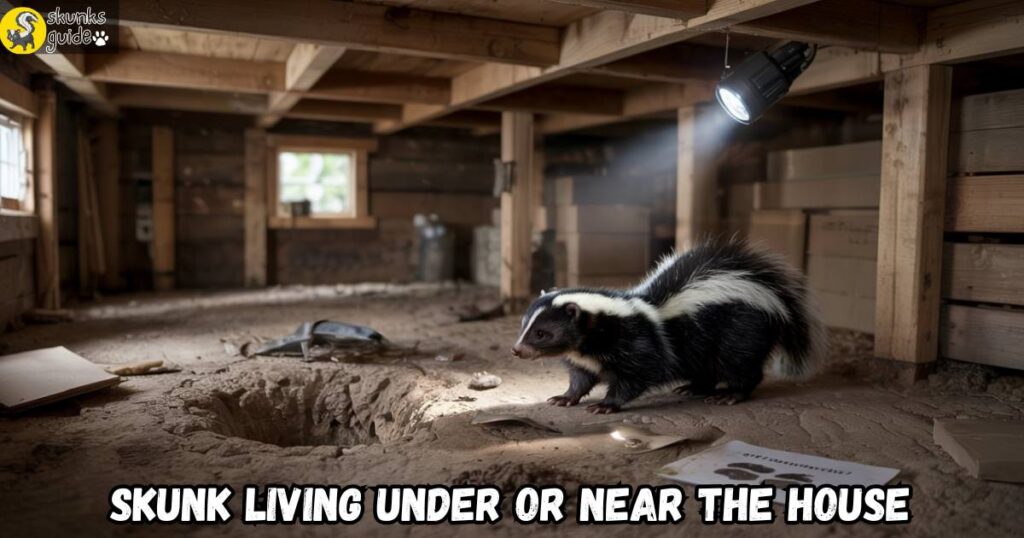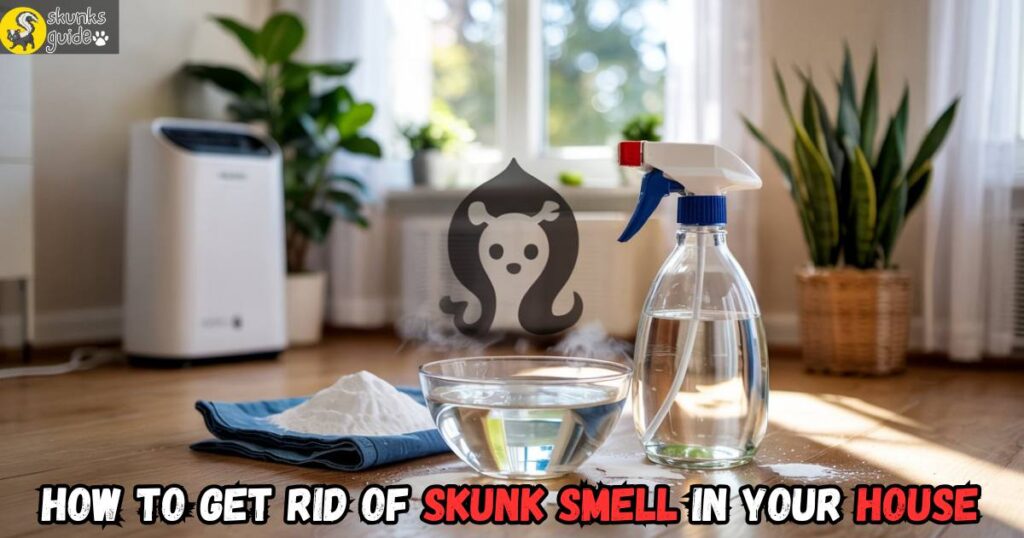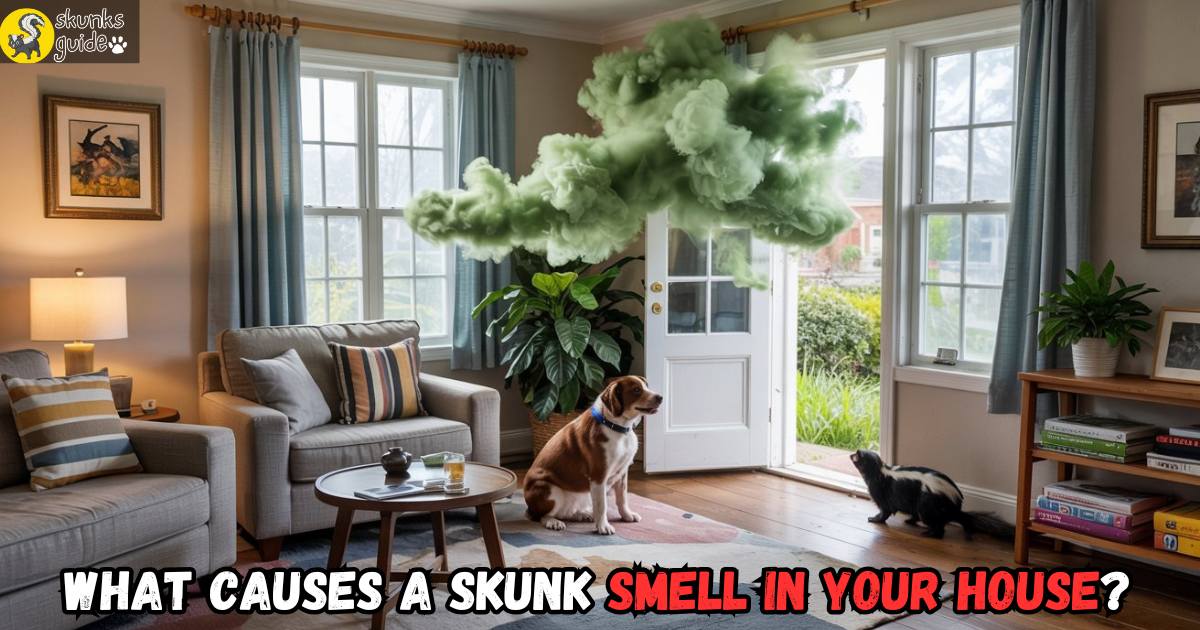What Causes a Skunk Smell in Your House? (And How to Remove It)
If you’ve suddenly noticed a pungent, burnt-rubber or rotten-onion smell wafting through your home, there’s a good chance you’ve got a skunk-related issue on your hands. Whether you live in a rural area or the suburbs, skunk spray has a way of sneaking into homes—even if the skunk itself never steps inside.
In this guide, we’ll explore what causes a skunk smell in your house, how to identify the source, and—most importantly—how to get rid of it for good.
🧠 As a wildlife behavior expert with years of experience in skunk research, I’ll walk you through everything you need to know to reclaim your home from the stink.
What Causes a Skunk Smell in Your House?
Skunk spray can enter your house in several surprising ways. It doesn’t always mean a skunk is inside—the smell can travel through vents, crawl spaces, and even your pet’s fur.
Here are the top causes:
1. A Skunk Sprayed Near Your Home’s Foundation
Skunks often burrow under decks, porches, or sheds. If a skunk was startled nearby and sprayed, the odor can seep into your home through:
- Cracks in the foundation
- Crawl spaces
- HVAC systems
- Plumbing gaps
2. Your Pet Got Sprayed and Brought It Inside
One of the most common culprits: your dog or cat gets skunked and then runs inside before you can stop them. Even after a quick bath, the smell lingers in carpets, bedding, and upholstery.
3. Skunk Spray on Outdoor Furniture or Items
Skunk oil can cling to:
- Patio cushions
- Plastic bins
- Shoes and clothes left outside
If these items are brought inside before the smell is gone, the odor spreads indoors.
4. HVAC or Vent System Pulled in the Odor
If a skunk sprayed near an outdoor vent or AC unit, your HVAC system can circulate the smell through your entire house.
5. Skunk Living Under or Near the House

Skunks sometimes take shelter beneath homes, especially in winter or early spring. If they’re nesting below your floorboards or in your crawl space, even a small spray incident can cause days of lingering odor.
Skunk Smell Source Quick-Reference Table
| Possible Cause | Where to Check | Notes |
|---|---|---|
| Pet was sprayed | Fur, bedding, carpet | Bathe pet ASAP; wash all soft surfaces |
| Skunk outside foundation | Crawl space, deck, vents | Look for burrow holes or tracks |
| Skunk under the house | Basement, subfloor | Listen for movement at night |
| HVAC pulling in odor | Air vents, outdoor unit | Close vents temporarily; inspect filter |
| Contaminated items | Shoes, chairs, bins | Keep suspect items outdoors until cleaned |
Why Does Skunk Smell Last So Long?
Skunk spray contains thiols, sulfur-based compounds that are incredibly sticky and chemically stable. They bind to:
- Fabrics
- Skin oils
- Plastics
- Wood
Once inside your home, these compounds can linger for days or even weeks if not neutralized.
You can’t just mask it—you need to break down the molecules.
How to Get Rid of Skunk Smell in Your House

Step 1: Identify the Source
Sniff near:
- Baseboards and vents
- Carpets, rugs, upholstery
- Pet beds and clothes
- Entryways and floors near doors
Step 2: Treat with Odor Neutralizers
Use products that oxidize or neutralize thiols—not just cover them up.
Try:
- Hydrogen peroxide + baking soda + dish soap (DIY mix)
- White vinegar spray (diluted 1:1 with water)
- Commercial enzyme cleaners like Nature’s Miracle
- Activated charcoal bowls placed in affected rooms
- Ozone generator (professional-level for serious cases)
Step 3: Wash Soft Surfaces
- Wash clothing and bedding with vinegar or enzymatic detergent
- Steam clean carpets and couches
- Air out rugs, cushions, and curtains in sunlight
Step 4: Air It Out
- Open windows and run fans
- Replace furnace filters
- Consider a HEPA air purifier with carbon filtration
What to Do If Your Pet Was Sprayed
If you suspect your dog or cat brought the smell inside, do the following immediately:
- Keep them outside if possible.
- Bathe them with a mixture of:
- 1 quart peroxide
- ¼ cup baking soda
- 1 tsp dish soap
- Dry them thoroughly and clean any surfaces they touched.
FAQ: Skunk Smell Inside the House
A skunk may have sprayed nearby or under your house, or your pet may have brought it in. The smell travels easily and can enter through vents or open windows.
Without treatment, it can linger for days or even weeks. Treated properly, it fades within 1–3 days.
It’s not usually dangerous in small doses, but high concentrations can cause nausea, headaches, and eye irritation. Ventilation is key.
Listen for scratching or thumping at night. Look for holes or disturbed soil around your foundation, deck, or porch.
Summary: What to Check & How to Solve It
- 🏡 A skunk smell in your house often comes from spray under the foundation, HVAC systems, or contaminated pets/items.
- 🔍 Check for burrows, odor sources, and recent pet activity.
- 🧴 Treat with neutralizers like peroxide, vinegar, or enzyme sprays.
- 🧼 Wash all soft items and ventilate thoroughly.
- 🚫 Never try to mask the smell—it must be chemically neutralized.

